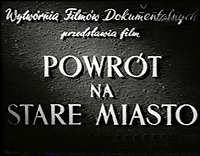 Powrót na Stare Miasto
Powrót na Stare Miasto
Poland, 1954, black and white/colour, 20 mins
In essence a documentary about the recreation of Warsaw’s Old Town, all but destroyed during World War II, Jerzy Bossak’s film has enough genuinely powerful images of the large-scale restoration and reconstruction process to compensate for the commentary’s attempts at rewriting Warsaw’s history from an almost exclusively Communist perspective – the price a Polish film from the early 1950s had to pay for being allowed to conduct an unashamed celebration of the past.
The film begins with shots of ruins silhouetted against time-lapsed clouds, deftly providing a visual suggestion of the passage of time as Andrzej Łapicki’s narrator says that it took seven centuries and thirty generations of artists and master craftsmen to build it. In an initially startling sequence, the surviving façades of the buildings then start to collapse in rapid succession, though it’s quickly established that this is a deliberate act, not of vandalism but as the prelude to wholesale reconstruction.

Workers straight out of the most archetypal Socialist Realist propaganda then march into the frame (accompanied by a suitably martial song), and the digging and bricklaying begins in earnest, while the commentary assures us that the Old Town will be rebuilt brick by brick, to match people’s memories. Historians, conservationists and architects pore over archive documents to try to establish what those were, before drawing up plans to replicate them, which masons and craftsmen translate into physical reality.
As the builders work, the commentary stresses that they’re up against a deadline: the Old Town reconstruction must be finished on 22 July 1954. (a crucial public holiday), and the sense of urgency propels what would otherwise be routine shots of construction sites in operation. (That said, the sequences of the Old Town literally rising from the ashes have an evocative force of their own). The editing becomes increasingly rapid, in line with the commentary’s prompting – “Attention, comrades! It’s already July!”. Finally, as a crowd of workers shins up the scaffolding to start taking it down, the film cuts to its second, very different reel.

As Stanisław Skrowaczewski’s music becomes gentler and more lyrical (at one point incorporating the sound of onscreen bells), the film shifts from black and white to colour (albeit charmingly faded in the print under review), and the deadline-driven emphasis on progress turns into a nostalgic celebration of Warsaw’s past as the Old Town comes to life once again, its streets and squares full of happy residents, workers and visitors – including Poland’s first Communist President, Bolesław Bierut.
Unsurprisingly for the period, the commentary continues to take an explicitly Socialist Realist line when alluding to the opulence of the buildings and the aristocrats who occupied them as compared with the suffering of the downtrodden poor. But though it’s a predictably selective vision of the past (the commentary says “it’s impossible to count all the events”, but finds space for the Polish-born founder of the Soviet secret police, Feliks Dzierżyński, and his address to Warsaw workers), there’s little on screen to support it, and it’s easy enough to tune out the party-line soundtrack and just admire the images, especially the aerial shots of the entire Old Town towards the end, emphasising what an extraordinary achievement its reconstruction was.
The film also makes for an instructive comparison with The Lublin Old Town (Lubelska starówka), made by Bohdan Kosiński two years later – this also documents a major reconstruction project, but from an altogether more sarcastic perspective that was presumably out of the question in 1954.
- Director: Jerzy Bossak
- Camera: Franciszek Fuchs
- Editor: Wacław Kaźmierczak
- Sound: Bohdan Jankowski
- Music: Stanisław Skrowaczewski
- Text: Karol Małcużyński
- Commentary: Andrzej Łapicki
- Production Manager: Bolesław Witanowski
- Production Company: WFD